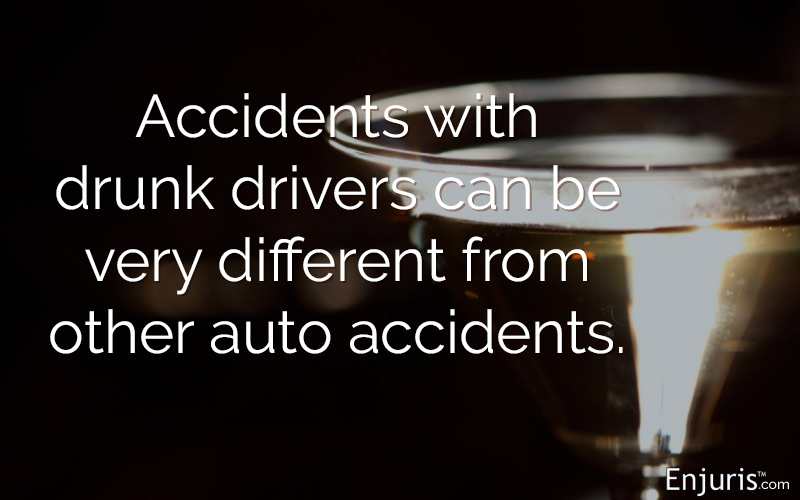Hablamos español.

Texas drinking and driving laws and lawsuits
Texas is known for a lot of things, including barbecue, live music, and hot temperatures. Unfortunately, Texas is also recognized as the state that leads all others when it comes to the number of alcohol-impaired driving fatalities.
Driving under the influence can not only result in a fine or license revocation, but can easily cause catastrophic injuries that can forever affect a family.
The first step to recovering from a drunk driving accident in Texas is understanding the laws concerning drunk driving, the penalties for driving while intoxicated, and the options for receiving compensation following a drunk driving accident.
Legal alcohol limit for driving in Texas
In Texas, a person is legally intoxicated and can be arrested and charged with driving while intoxicated (DWI) if they have a blood or breath alcohol concentration (BAC) of .08 g/dL.
In addition, a person driving a vehicle can be convicted of a DWI even if their BAC is lower than .08 g/dL if they have normal use of their mental or physical faculties as a result of alcohol or some other drug.
Finally, if you’re under the age of 21, Texas has a “no-drop” law that makes it illegal to have any detectable amount of alcohol in your system while operating a vehicle.
How much is too much?
It’s important to understand that impairment begins with the first drink. Your gender, body weight, tolerance, and the food you’ve eaten all affect your body’s ability to process alcohol. In general, women, young people, and small people become impaired with less alcohol.
To find out roughly how many drinks it takes to reach the legal BAC limit for your weight, visit the Texas Alcoholic Beverage Commission.
Implied consent laws in Texas
Every person who operates a motor vehicle in Texas automatically gives consent to Texas police to test their BAC level, so long as the police officer has reasonable grounds to believe the person is intoxicated. This is known as the “implied consent” law.
If you refuse to take a BAC test, you’ll face stiff penalties depending on your DWI history, including the suspension of your license for a minimum of 180 days.
Penalties for driving drunk
Texas DWI penalties vary depending on the number of convictions:
| DWI Penalties in Texas | |||
|---|---|---|---|
| Penalty | 1st offense | 2nd offense | 3rd offense |
| Jail Time | 3–180 days | 1 month–1 year | 2–10 years |
| Fine | $2,000 maximum | $4,000 maximum | $10,000 |
| License Suspension | 1 year maximum | 2 year maximum | 2 year maximum |
| Special Ignition Switch Required | No | Yes | Yes |
You can also be charged with child endangerment for driving while intoxicated if you're carrying passengers younger than 15 years old. DWI with a child passenger is punishable by:
- A fine of up to $10,000
- Up to 2 years in a state jail
- Loss of your driver’s license for 180 days
Criminal charges vs. civil lawsuits in a Texas DUI accident
It’s important to note that there could be two aspect of a Texas DWI accident—criminal and civil liability.
DWI is a crime. The penalties listed above are sentences issued by criminal proceeding.
If a person is caught driving drunk, they can be charged with a DWI offense whether or not they caused an accident. It’s a crime regardless of whether anyone else was injured.
Only a government agency (state or local prosecutor) can file criminal charges. The defendant is entitled to a trial, and the sentence can include jail time, fines, license suspension, and other penalties if they are convicted.
However, if you were injured by a drunk driver and wish to file a personal injury lawsuit to be compensated for your losses, this is separate from the criminal proceeding.
A criminal conviction could provide an injured victim with a sense that justice has been served, but it does not provide financial compensation. If you’re a victim who was injured, your recourse would be to file a personal injury lawsuit. The outcome of a civil lawsuit could be different from a personal injury lawsuit. The civil personal injury lawsuit would require the plaintiff (injured person) to prove by a preponderance of the evidence that the defendant’s negligence caused the victim’s injuries.
Justice is an elusive concept. Some may feel it achieved with just a conviction, others want a monetary recovery. At the end of the day, while the legal system can provide some relief, it is not a cure-all. Rarely do both parties leave a courthouse happy.
Texas’ Dram Shop Act
Bars and restaurants in Texas can be held liable for drunk driving accidents in certain situations. The law that determines if a bar or other establishment can be held liable is called the Dram Shop Act.
In order to be liable in a drunk driving accident, an employee at a bar or other place that serves alcohol must have done at least 1 of 2 things:
- Sold alcohol to an individual who was obviously intoxicated
- Sold alcohol to a minor who went on to cause a drunk driving accident
An employer can avoid liability by showing that:
- The employer required employees to attend training in order to sell alcohol
- The employee in question attended the training sessions
- The employer didn’t encourage the employee to ignore the Dram Shop Act
As you can imagine, most Dram Shop Act cases focus on whether the individual was “obviously intoxicated.” Witnesses and security footage are commonly used as evidence in these cases.
How are drunk driving accidents different from other car accidents?
In many ways, drunk driving accidents are similar to other types of car accidents. Both involve serious injuries, an attempt to assign liability, and negotiations with insurance providers to reach a settlement.
However, drunk driving accidents are different in 2 important ways.
First, proof of a DWI constitutes negligence per se. This means that in order to assign liability a person injured in a drunk driving accident doesn’t have to prove all 4 elements of negligence:
- Duty
- Breach
- Causation
- Harm
Rather, the person only has to show that the defendant caused their harm (the last 2 elements of negligence).
Second, a person injured in a drunk driving accident is more likely to receive punitive damages than a person injured in a car accident where alcohol isn't involved.
Punitive damages are used to punish the individual at fault and discourage others from behaving similarly. Punitive damages only apply if the defendant acted intentionally or with gross negligence. In most cases, driving while intoxicated constitutes gross negligence.
Since proof of a DWI constitutes negligence per se, the drunk driver will likely be held at least partially responsible for the accident.
However, there may be instances in which both drivers are held liable for the accident.
If the injured person was also negligent at the time of the accident, they may be held partially liable, although not likely to the same degree as the drunk driver.
Texas is what is known as a modified comparative fault state. This means that a plaintiff’s damages are reduced by their percentage of fault. For example, if your damages are $100,000, but the judge or jury finds you 30% at fault for the accident, your damages will be reduced to $70,000.
What’s more, under the modified comparative fault theory, you’re prohibited from recovering any damages if you’re found to be more than 50% at fault.
What to do if you’re hit by a drunk driver
If you’re hit by a drunk driver, you should call the police immediately. When the police arrive, be sure to explain that you suspect the other driver is intoxicated. Your statement may help the police officer establish the necessary reasonable grounds to administer a field sobriety test.
In addition to calling the police, be observant. Sometimes an intoxicated driver will attempt to hide alcohol bottles or other evidence.
Once the authorities have been alerted and you make sure you're physically okay, contact a Texas personal injury attorney. The driver will face jail time and fines, but you’ll need to hire your own attorney if you want to sue for damages stemming from the accident.
Introducing Bentley's Law
in Texas
A monumental move against intoxication manslaughter. This legislation ensures that drivers guilty of this crime are financially responsible for the minor children of parents they've tragically taken. Discover Texas's proactive stance on DUI accident responsibility.
Sources
Texas Public Law, Section 49 of the Texas Penal Code
The National Highway Traffic Safety Administration, Alcohol-Impaired Driving
Texas Legislature Online, Title 7, Chapter 724 of the Texas Transportation Code
Texas Department of Transportation, DUI Drivers in Fatal Crashes by Driver Age
See our guide Choosing a personal injury attorney.


